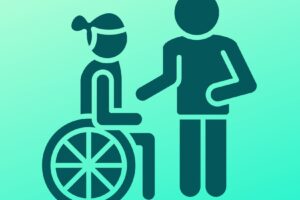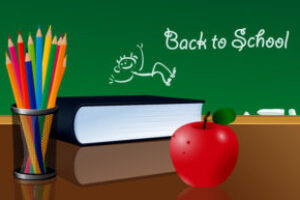I did a post about reading to our children which focused on some of the benefits of reading: bonding, intimacy, focus, sitting skills, increased exposure to language, and more. I thought I would revisit this post since March is Reading Month! Reading aloud to kids of all ages and all disabilities has clear cognitive and behavioral benefits. To celebrate the importance of reading, I wanted to point out another reason why reading is just as important to our students with disabilities… communication. Parents ask me all of the time how to increase communication skills, specifically the ability to talk, and my response is read, read, read to them. And then read some more! According to Pathways.org, you can encourage communication development by smiling, talking, playing, and… reading with your baby/child/teen/young adult/adult.
A baby’s communication begins the minute he/she is born, it is instinctive. They cry, they coo, they use facial expressions, and body language long before they say their first words. The ability to communicate using words begins with interaction. The interaction between babies and their moms and dads, brothers and sisters, grandmas and grandpas, aunts and uncles, and everyone else. And typically, what does those interactions look like with babies? The use of high-pitched, sing song voices, playing with sounds (boo), use of facial expressions and gestures, describing your actions (flying), and encouraging two-way communication (even with sounds). All the while, the baby is looking at and taking in everything he/she sees: how lips move, facial expressions, body language, and more. That is what builds communication skills. Reading incorporates all of the above.
When reading, using high-pitched and sing-song voices helps get and keep the attention of the child while you read. Getting silly while reading and making sounds that connect with what your child is doing during the story telling promotes engagement and mimicking your behaviors. Facial expressions and gestures that communicate the meaning of words in the book takes reading to a whole new level. As does describing and imitating the actions in the story like flying, jumping, or singing. You see, reading not only provides special, one-to-one time, it also provides a focused opportunity to listen to language and practice developing speech, language, and communication skills. Your child is not only listening, he/she is also watching! How your lips come together to form the “b” sound, how your arms move to demonstrate a flying plane, or how your lips pucker when you use the word sour. Daily reading increases a child’s exposure to communication and language development. But, one may wonder, does it work?
Absolutely, positively… yes!!! I had a kindergartner who came to me with no verbal language. She would vocalize sounds, and some of her sounds did sound like vowel sounds, especially the letters “b” and “e”. At my first IEP with the family, when it came time to discussing goals, I asked Aaliyah’s mom if there was anything she would like for me and my team to work on. Immediately mom said yes, she wanted her daughter to learn how to talk. My speech therapist at the time gave mom strategies for what could be done at home, emphasizing the need to read to her every single day. My speech therapist even went into what reading at home should look like (reference everything above). This mom looked at me skeptically, but I assured her that what my speech therapist was saying was indeed true. I also assured Aaliyah’s mom that we do the same in the classroom! That not only do my paras and I read to her, but that we engage in silly songs which emphasizes the sounds that Aaliyah already makes, and encourages sounds that she does not make (another post for later). In a joint effort (home and school), Aaliyah started making more and more vowel and consonant sounds, which lead to forming beginning word sounds and ending word sounds, which led to single word utterances, to managing complete words! Now, she talks your head off!!! If you are wondering, she is not my only success story 😉
As one Speech Therapist told me years ago, “reading is, in her opinion, one of the best ways of helping to develop a child’s speech, language and communication skills. Make reading a daily activity, no, not an activity, a habit. Parents, are you reading to your children? Teachers, are you reading to your students?



